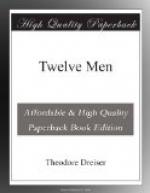And the results of these encounters with beauty! Always he had something most important to attend to, morning, noon or night, and whenever I encountered him after some such statement “the important thing” was, of course, a woman. As time went on and he began to look upon me as something more than a thin, spindling, dyspeptic and disgruntled youth, he began to wish to introduce me to some of his marvelous followers, and then I could see how completely dependent upon beauty in the flesh he was, how it made his life and world.
One day as we were all sitting in the office, a large group of vaudevillians, song-writers, singers, a chance remark gave rise to a subsequent practical joke at Paul’s expense. “I’ll bet,” observed some one, “that if a strange man were to rush in here with a revolver and say, ‘Where’s the man that seduced my wife?’ Paul would be the first to duck. He wouldn’t wait to find out whether he was the one meant or not.”
Much laughter followed, and some thought. The subject of this banter was, of course, not present at the time. There was one actor who hung about there who was decidedly skillful in make-up. On more than one occasion he had disguised himself there in the office for our benefit. Cooeperating with us, he disguised himself now as a very severe and even savage-looking person of about thirty-five—side-burns, mustachios and goatee. Then, with our aid, timing his arrival to an hour when Paul was certain to be at his desk, he entered briskly and vigorously and, looking about with a savage air, demanded, “Where is Paul Dresser?”
The latter turned almost apprehensively, I thought, and at once seemed by no means captivated by the man’s looks.
“That’s Mr. Dresser there,” explained one of the confederates most willingly.
The stranger turned and glared at him. “So you’re the scoundrel that’s been running around with my wife, are you?” he demanded, approaching him and placing one hand on his right hip.
Paul made no effort to explain. It did not occur to him to deny the allegation, although he had never seen the man before. With a rising and backward movement he fell against the rail behind him, lifting both hands in fright and exclaiming, “Why—why—Don’t shoot!” His expression was one of guilt, astonishment, perplexity. As some one afterwards said, “As puzzled as if he was trying to discover which injured husband it might be.” The shout that went up—for it was agreed beforehand that the joke must not be carried far—convinced him that a hoax had been perpetrated, and the removal by the actor of his hat, sideburns and mustache revealed the true character of the injured husband. At first inclined to be angry and sulky, later on he saw the humor of his own indefinite position in the matter and laughed as heartily as any. But I fancy it developed a strain of uncertainty in him also in regard to injured husbands, for he was never afterwards inclined to interest himself in the much-married, and gave such wives a wide berth.




